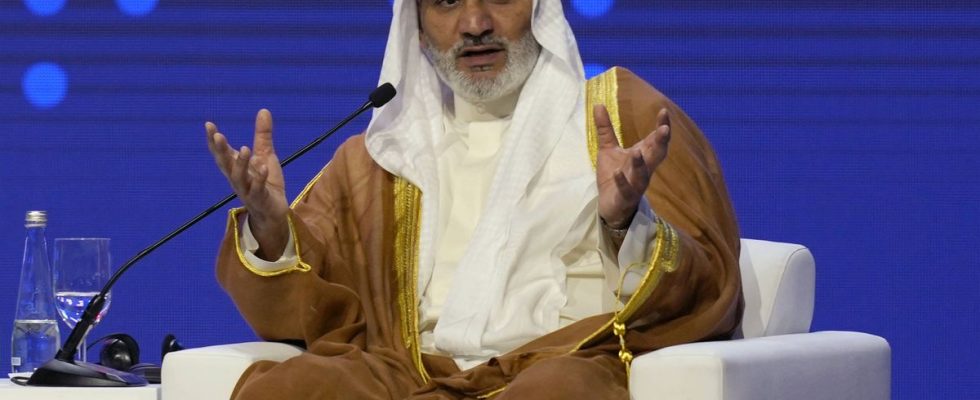A small letter with big consequences, in the middle of COP28 in Dubai. The Kuwaiti Haitham al-Ghais, secretary general of the oil exporting countries (OPEC), in a letter dated Wednesday urged the member or associated countries of the organization to reject an agreement targeting fossil fuels. How to interpret this heat wave from OPEC? 20 minutes takes stock with Professor Jean-Pierre Favennec, professor, specialist in energy and oil.
What’s the situation?
A few days before the end of COP28, Haitham al-Ghais, secretary general of OPEC, asked Wednesday in a letter “with a sense of extreme urgency” to its 13 members and the ten other countries associated with the organization to “proactively reject any text or formulation that targets energy, that is to say fossil fuels, rather than emissions” of greenhouse gases. “We must continue to use all energies, otherwise the world will not be able to meet demand,” said Ayed al-Qahtani, OPEC research director, from the podium.
These declarations caused a hundred countries, including France, to jump. “I am counting on the presidency of the COP not to be impressed by these declarations and to reach an agreement which affirms a clear objective of phasing out fossil fuels,” insisted the Minister of Energy Transition Agnès Pannier-Runacher.
The goal of the world’s largest oil exporters is to prevent COP28 from making a firm commitment to abandon fossil fuels. For now, the pressure seems to have borne fruit, especially since OPEC is playing at home in Dubai: the new draft agreement reached this Monday calls for the “reduction in consumption and production of fossil fuels” but does not mention an “exit”.
Why did the OPEC Secretary General put on pressure?
Because the heavyweights of black gold are simply afraid for their economy. “Many of these countries are completely dependent on oil for their budgets. In Algeria, hydrocarbon exports represent more than 90% of total exports,” immediately indicates Professor Jean-Pierre Favennec, specialist in energy and oil, before mentioning another major exporter on the continent, the Nigeria. An exit from fossil fuels “would disrupt the global economy and increase inequalities in the world,” Iraq for its part recently judged.
In addition, certain countries, such as Mozambique or Senegal, have discovered gas or oil deposits and would like to exploit them. “Their argument is to say: we emit very little greenhouse gas (48 African countries emitted less than 1% of emissions of global CO2 since 1751), and we are going to be banned from exploitation by countries which have stuffed the atmosphere for two hundred years with the industrial revolution,” continues Jean-Pierre Favennec.
Another reason for concern for producers: the price of a barrel. After rising at the start of the war in Ukraine, the price of oil fell, forcing OPEC to reduce production to raise prices. This could have created tensions within the organization. “Some countries do not respect the reduction quotas imposed and force the heavyweights (Saudi Arabia, United Arab Emirates, Kuwait) to limit production even more,” indicates our expert.
Is OPEC right to be afraid?
“OPEC feels that the future of the sector is being played out here. We feel that there is a bit of panic on board,” he confided this weekend to France 2 François Gemenne, co-author of the sixth IPCC report. “The desperate resistance of OPEC (…) reveals its fear that the tide is turning,” judged Andreas Sieber, climate activist with AFP. As for Jean-Pierre Favennec, he comments: “the subject is being attacked head-on, hence the knee-jerk reaction from OPEC. To satisfy everyone, we would have to find a gradual, rapid exit so as not to precipitate global warming; but not too fast either, so as not to deprive people of energy and producing countries of their resources. »
A balance to find, especially as certain producing countries begin to consider the post-oil era. This is the case of Saudi Arabia and its Ambition 2030 plan which should make it possible to switch to renewable energies. “The kingdom also wants to become a major exporter of green hydrogen,” points out our specialist. The United Arab Emirates have focused on solar power.
Will COP28 take a first step marking the beginning of the end of the oil era? The producing countries know that they are under pressure in any case, while activists have organized an action within the OPEC pavilion in Dubai. “For us, having an OPEC pavilion at the COP,” said Nicolas Haeringer of the NGO 350.org, “is like having a huge oil rig in the negotiations. »

